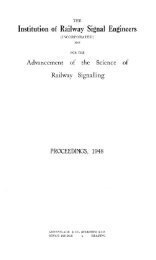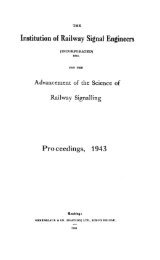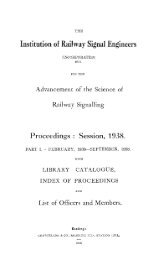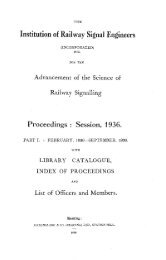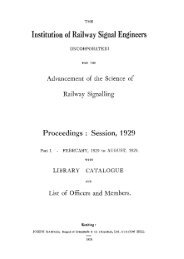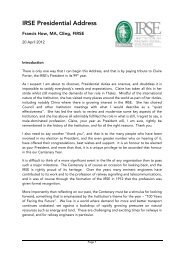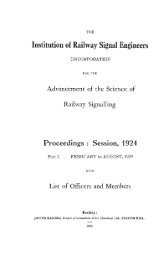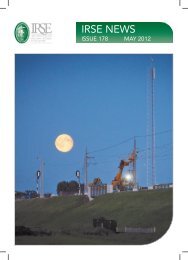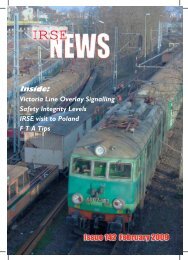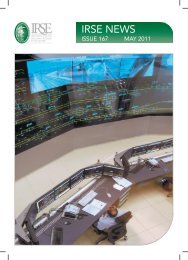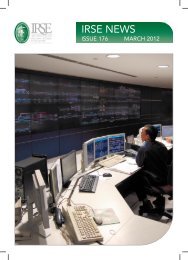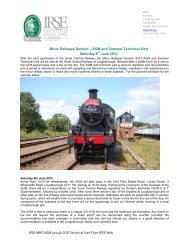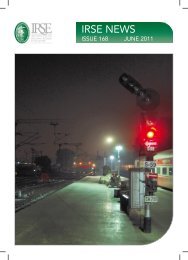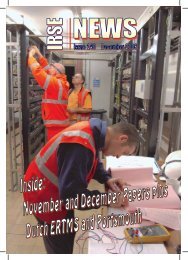IRSE Sept 08.indd
IRSE Sept 08.indd
IRSE Sept 08.indd
You also want an ePaper? Increase the reach of your titles
YUMPU automatically turns print PDFs into web optimized ePapers that Google loves.
APPRENTICESHIP AWARD<br />
<strong>IRSE</strong><br />
Rising to the Challenge<br />
The Network Rail Advanced<br />
Apprenticeship Scheme<br />
by Bill Alexander, Network Rail<br />
The last time I wrote for <strong>IRSE</strong> NEWS, I used the old children’s rhyme of Old Mother<br />
Hubbard, and the lack of food for her dog as an analogy of where we were as an industry<br />
with signal engineering resources within the UK. Carrying on from that analogy<br />
I’m pleased to say that Old Mother Hubbard has had a change in fortune, and now<br />
she has a regular supply of pedigree chum, or in railway terms we now have a regular<br />
supply of new blood coming into the industry, with Network Rail at the forefront of<br />
developing the future resources.<br />
The last five years have seen significant<br />
changes, with the building of new railway<br />
skills training centre at Paddock Wood and<br />
Larbert, with the one at Bristol nearing<br />
completion, and more planned.<br />
In addition:-<br />
The Foundation Degree at Sheffield<br />
University is now in its fifth year;<br />
The engineering conversion programme<br />
is creating 24 signal designers a year;<br />
There has been a significant increase in<br />
engineering graduate intake to around<br />
100 per year;<br />
Network Rail have opened a leadership<br />
centre at Westwood;<br />
And this year sponsoring of a Project<br />
Management MSc with Warwick<br />
University and University College<br />
London;<br />
2008 also sees the first graduation of<br />
176 Apprentices from the Network Rail<br />
Advanced Apprenticeship Scheme, of<br />
which 77 are signal maintenance<br />
technicians.<br />
The Network Rail Advanced Apprenticeship<br />
Scheme was launched in <strong>Sept</strong>ember 2005,<br />
in a unique partnership with Flagship<br />
Training and the Royal Navy. Apprentices<br />
are recruited as either, Track, Signal or<br />
Electrification & Plant Apprentices, and<br />
undergo a bespoke programme relevant to<br />
their individual needs. As part of the three<br />
year scheme, the apprentices spend the<br />
first year undergoing basic engineering<br />
training along side the Royal Navy at<br />
HMS Sultan, in Gosport.<br />
HMS Sultan is the Royal Navy’s School<br />
of Mechanical, Electrical and Aeronautical<br />
Engineering, which is the largest engineering<br />
training establishment in Europe. The<br />
apprentices undergo a programme of<br />
academic and vocational development<br />
which leads to the award of the BTEC level<br />
3 in Engineering, and a NVQ level 2 in<br />
Performing Engineering Operations across<br />
a range of different skills including<br />
mechanical fitting, electrical installation<br />
and electronics.<br />
In addition to the technical training<br />
received at HMS Sultan, there is a real<br />
emphasis placed on personal development,<br />
and it is this aspect which really<br />
makes the scheme a winner. Living and<br />
working along side the Royal Navy has<br />
obvious benefits in terms of personal<br />
discipline, but no, it’s not a boot camp, the<br />
military values are absorbed by osmosis<br />
rather than being overtly engaged. The<br />
apprentices also benefit from living in<br />
dormitories, where the cultural, and<br />
geographical mix means that they must<br />
learn to live together, and bond into strong<br />
supportive teams. We have apprentices<br />
who come from very rural backwaters<br />
living cheek by jowl with others from inner<br />
cities. The old adage of a problem shared<br />
is a problem halved is multiplied when<br />
there are six apprentices to a dormitory, so<br />
sharing and being supportive of each other<br />
is something that they soon learn the benefits<br />
of. Understanding different values<br />
and beliefs and embracing differences<br />
rather than concentrating on difference<br />
was recognised by OFSTED who judged the<br />
approach to equality and diversity as<br />
outstanding. This is one of the key<br />
benefits which led to Network Rail being<br />
awarded the Chartered Institute of<br />
Personal and Development [CIPD] award<br />
for the best Human Resource initiative in<br />
the UK in 2007.<br />
Ian Coucher being presented with the IET’s<br />
accreditation certificate for the Apprenticeship<br />
scheme by Colin Porter, representing<br />
the IET, at HMS Collingswood on 13 June<br />
2008. (Network Rail)<br />
The development of apprentices carries<br />
on after their first year at HMS Sultan, with<br />
two more years of structured learning both in<br />
the workplace and attending a whole range<br />
of technical and personal development<br />
courses. The signal apprentices spend their<br />
two years undertaking a variety of placements<br />
with the maintenance teams, fault<br />
teams, technical support, planning, and<br />
even a month with the P Way maintenance<br />
teams. This ensures that they have a<br />
rounded understanding of railway engineering<br />
as well as an in-depth competence in<br />
railway signalling.<br />
The apprentices also return to HMS<br />
Sultan for 16 weeks residential training,<br />
spread in two week blocks over the two<br />
years, this time concentrating on railway<br />
specific engineering skills. Network Rail<br />
have built their own training centre, within<br />
HMS Sultan, and equipped it with a full<br />
range of railway equipment. The delivery<br />
team for the year 2/3 training have been<br />
drawn from experienced railway engineers<br />
from around the UK. The technical<br />
courses start with basic signalling and go<br />
through the full range of maintenance<br />
training framework, cumulating in Signal<br />
Maintenance Testing Handbook [SMTH]<br />
and Route Relay Interlocking [RRI]<br />
maintenance and faulting.<br />
The scheme has recently received<br />
approved scheme status from both the<br />
Institution of Engineering & Technology<br />
[IET] and the Institution of Mechanical<br />
Engineers [IMechE], allowing graduates<br />
from the scheme to join professional<br />
institutions and gain in due course<br />
EngTech registration with EC UK .<br />
Encouraging the technicians, managers<br />
and engineers of the future to take their<br />
first step on the professional engineering<br />
ladder, is another key objective.<br />
<strong>IRSE</strong><br />
NEWS Issue 137 <strong>Sept</strong>ember 2008 23



